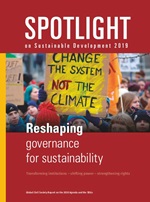Human Rights in the 2030 Agenda
Published on Tue, 2019-09-10 14:52
Human rights are explicitly inscribed in the purpose, vision and normative foundations of the 2030 Agenda for Sustainable Development and the Sustainable Development Goals (SDGs). This grounding of Agenda 2030 in human rights standards – a hard-won civil society victory – represents an enormously significant evolution in the historically uneasy relationship between human rights and development in the global governance arena. If human rights are to help the SDGs “transform our world”, three fundamental steps are needed to disrupt the selectivity and hypocrisy still surrounding the issue in the sphere of global development governance. First, human rights must be articulated and understood holistically, encompassing their economic, social and environmental dimensions, and recognizing their relevance to the entirety of the 2030 Agenda, not just Goal 16 on peaceful and just societies. Second, spaces must be not only defended but expanded for those most affected by development injustice to hold those responsible to answer for their actions and omissions through the broader ecosystem of accountability that human rights opens up. Third, governments must adopt a radically different approach to international cooperation and global partnership founded on the recognition of their common but differentiated responsibilities to respect, protect and fulfil human rights within and beyond their borders. Read this chapter here. By Ignacio Saiz, Center for Economic and Social Rights (CESR). |


